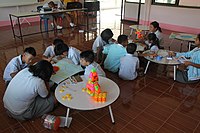
Photo from wikipedia
The paper reports on an empirical study adopting a mixed research method, aiming at improving primary students’ collaborative problem solving competency in project-based learning with productive failure (PF) instructional design… Click to show full abstract
The paper reports on an empirical study adopting a mixed research method, aiming at improving primary students’ collaborative problem solving competency in project-based learning with productive failure (PF) instructional design in a seamless learning environment. Two Grade Six classes participated in a project-based learning of “Plant Adaptations”. In Class 1 with 27 students, the project-based learning was conducted with PF instructional design; in Class 2 with 26 students, the project-based learning was conducted without PF instructional design. The learning activities spanned across farm, class, home and online spaces supported by mobile devices. Data collection includes various students’ created artifacts in groups in the inquiry process, student reflections, student focus group interviews and pre- and post-domain tests. Both qualitative and quantitative data analysis methods were employed. The research findings show that compared to Class 2, the students in Class 1 gained deeper understanding of conceptual knowledge and produced better group artifacts in collaborative problem-solving quality than those in Class 2; and the students in Class 1 were more positive in facing the challenges in their project-based learning process, and developed a sense of ownership of their learning. The findings imply that PF instructional design is conducive to developing primary students’ collaborative solving competency in science learning in a seamless learning environment.
Journal Title: Educational Technology Research and Development
Year Published: 2018
Link to full text (if available)
Share on Social Media: Sign Up to like & get
recommendations!